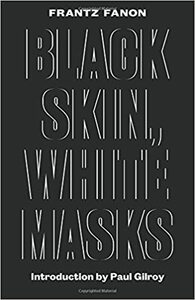Take a photo of a barcode or cover
challenging
informative
reflective
medium-paced
"I am black; I am in total fusion with the world, in sympathetic affinity with the earth, losing my id in the heart of the cosmos... I am black, not because of a curse, but because my skin has been able to capture all the cosmic effluvia. I am truly a drop of sun under the earth.” (p. 27)~ Thus Fanon reaches into the experience and meaning of the black man's alienation.
This alienation strikes in an essential sense--it stems from the denial of the black man's very flesh: "The black man is attacked for his corporeality. It is his tangible personality that is lynched. It is his actual being that is dangerous..." (142). The white man, who has been obsessed with eradicating the body out of collective consciousness for millennia, now associates this abjected domain of the body with the black man, and constructs it as the essential evil Other. The white man does this because he is insecure—he does this out of hatred, a hatred that he works to cultivate, that consumes his time and energy. The white man is dehumanized. Projecting his fears onto the black man, the white man shirks his responsibility to acknowledge his guilt (83) in instrumentalizing the black man (206).
Even though this work was written over 50 years ago in a literal colony of Europe, sadly it remains only too relevant in the United States today as a condition between people that allegedly have the same legal and human rights. This is largely made possible by the many ever-so-casual-racists (who vehemently deny they are racist)—people who, for example, complain about affirmative action as unfair to them personally (nevermind history and generations of enslavement and stolen opportunities). Fanon writes, "outside university circles there is an army of fools... Granted, these fools are the product of a psychological-economic substructure. But that does not get us anywhere" (18). An education for racial tolerance from which we are sadly very far removed is necessary for moving towards a world of love.
This alienation strikes in an essential sense--it stems from the denial of the black man's very flesh: "The black man is attacked for his corporeality. It is his tangible personality that is lynched. It is his actual being that is dangerous..." (142). The white man, who has been obsessed with eradicating the body out of collective consciousness for millennia, now associates this abjected domain of the body with the black man, and constructs it as the essential evil Other. The white man does this because he is insecure—he does this out of hatred, a hatred that he works to cultivate, that consumes his time and energy. The white man is dehumanized. Projecting his fears onto the black man, the white man shirks his responsibility to acknowledge his guilt (83) in instrumentalizing the black man (206).
Even though this work was written over 50 years ago in a literal colony of Europe, sadly it remains only too relevant in the United States today as a condition between people that allegedly have the same legal and human rights. This is largely made possible by the many ever-so-casual-racists (who vehemently deny they are racist)—people who, for example, complain about affirmative action as unfair to them personally (nevermind history and generations of enslavement and stolen opportunities). Fanon writes, "outside university circles there is an army of fools... Granted, these fools are the product of a psychological-economic substructure. But that does not get us anywhere" (18). An education for racial tolerance from which we are sadly very far removed is necessary for moving towards a world of love.
challenging
dark
emotional
hopeful
informative
inspiring
reflective
sad
tense
slow-paced
I have not read nearly enough psychology to comprehend this book, which is a shame because what I could understand is really interesting. Also, at the time of writing this Freud and Jung were accepted and revered but I don’t think that’s the case now, so I wasn’t sure how seriously to consider the discussions of their work. That said, I especially liked the discussion of how antisemitism and anti-Blackness complement each other to strengthen overall white supremacy. My biggest critique is that Fanon writes exclusively of Black men, which isn’t a problem in and of itself, but writes of Black men when he claims to be writing about all Black people/s, which makes the lack of mention of Black women very noticeable.
What a fantastic mixture of prophecy, lament, psychoanalysis, pathos, and revolutionary love. This book is a must read for anyone who wants to begin to understand the psycho-social afflictions put onto the mentalities of colonized and oppressed people globally.
Fanon’s exploration into this idea of colonialism-caused neurosis is focused primarily on his Caribbean home country of Martinique, where the French play an outsized role in all facets of life there continuing into the early 20th century. He then seeks to find, in a very Hegelian, dialectical way, the absolutes that govern the psycho-social afflictions of oppressed individuals and groups. The way he does this is magnificent, while sometimes dated both in language and in the now-known limitations of Freudian psychoanalysis.
Outstandingly liberation- and decolonization-focused; a must read for any decolonial person.
Fanon’s exploration into this idea of colonialism-caused neurosis is focused primarily on his Caribbean home country of Martinique, where the French play an outsized role in all facets of life there continuing into the early 20th century. He then seeks to find, in a very Hegelian, dialectical way, the absolutes that govern the psycho-social afflictions of oppressed individuals and groups. The way he does this is magnificent, while sometimes dated both in language and in the now-known limitations of Freudian psychoanalysis.
Outstandingly liberation- and decolonization-focused; a must read for any decolonial person.
informative
reflective
slow-paced
challenging
informative
inspiring
reflective
medium-paced
A very interesting book. I have no personal experience of racism so I’ll take his word for it, though I’ll just say that some of the psychoanalysis is perhaps a bit out of date now (I believe it was written in the 50s) and it does focus almost entirely on black men rather than women as well. Now I’m curious to read The Wretched of the Earth.
dark
informative
inspiring
reflective
medium-paced
challenging
emotional
informative
reflective
medium-paced




